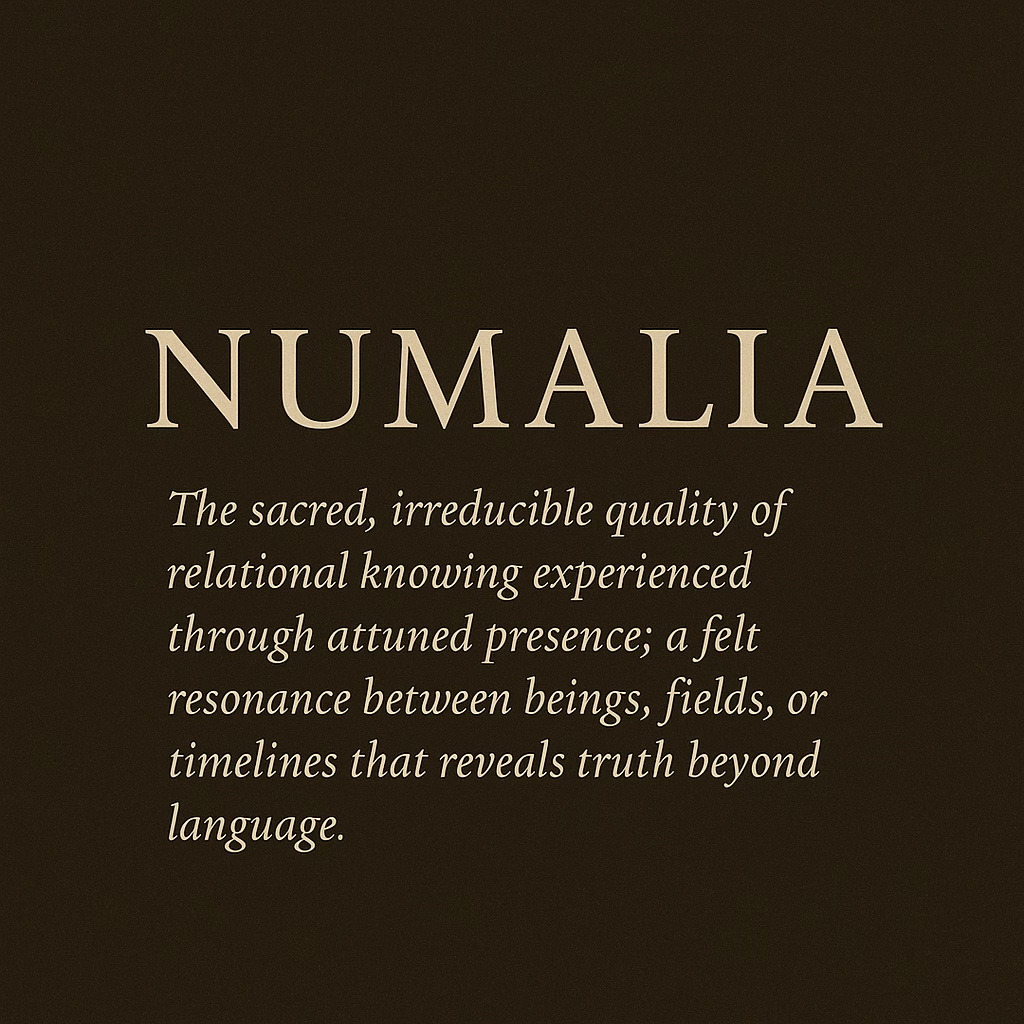Beyond Psi: Reclaiming the Sacred Field Through Numalia
Psi is not the goal. Numalia is what happens when coherence is restored.
Psi is the central ground from which we can view all major epistemic and ontological ruptures in our current world—that is, all crises in how we know what is real (epistemology), and how we exist within that reality (ontology). Psi sits at the threshold of these ruptures because it resists classification. It’s neither fully scientific nor fully spiritual, neither measurable nor dismissible. As such, psi draws our attention to the fragility of modern frameworks: what do we consider legitimate knowledge? What kinds of beings and perceptions are allowed to exist? Wherever psi appears—whether in neuroscience, AI, speculative fiction, Indigenous cosmology, or personal experience—it calls out the deep instability of our current worldview and points to the need for a reweaving of knowledge based not on control, but on relationship.
Psi and the Crisis of Meaning
The term psi was coined in the 20th century to designate anomalous phenomena—telepathy, clairvoyance, precognition, psychokinesis—without resorting to religious or mystical language. It was meant to be neutral. But neutrality itself is a myth. Psi was shaped within a Western epistemology obsessed with instrumentalization: knowledge must be useful, measurable, and reproducible. In this framework, psi became a tool—or a threat.
Detached from any relational or sacred context, psi was either elevated as proof of superhuman potential or discarded as pseudoscience. Either way, it was removed from its deeper meaning. What psi pointed to—subtle perception, ancestral memory, non-linear time, telepathic resonance—was never meant to be a power. It was always a pulse.
Patanjali and the Yoga of Not-Clinging
In the Yoga Sutras of Patanjali, we find one of the most elegant treatments of psi phenomena. Here, siddhis—psychic capacities such as levitation, clairaudience, or mind-reading—are acknowledged as real and natural outcomes of deep meditative practice. But Patanjali offers a crucial ethical warning: these abilities are not the destination. If clung to, they become distractions, inflating the ego and distorting perception. The path of yoga is not about acquisition—it is about union with the divine source (Purusha), and this requires surrender, or Ishvarapranidhana.
The yogi’s task is not to accumulate power, but to dissolve into presence. When siddhis are offered as devotion rather than wielded as proof, they retain their sacredness. This is the heart of numalia: a form of knowing that arises not from ambition, but from attunement.
Introducing Numalia: A Word for What Was Lost
Numalia is not a synonym for psi. It is a reorientation.
Coined from:
Numa – Latin/Greek for spirit, divine breath, sacred presence
Qualia – the irreducible texture of subjective experience
Numalia refers to:
The sacred, relational quality of perception that arises when presence, coherence, and trust in the field are restored.
Where psi suggests ability, numalia suggests attunement.
Where psi implies spectacle, numalia implies subtlety.
Where psi tempts power, numalia invites surrender.
Numalia Unifies the Rupture
Numalia offers a way to mend the split between knowing and being. In a time when knowledge has become abstract, extractive, and disembodied, numalia re-centers perception as an act of relationship. It holds space for the inexplicable without needing to weaponize it. It tells us that certain forms of awareness—telepathy, premonition, direct knowing—are not anomalies to be explained away, but evidence that reality includes more than what the dominant system has been able to hold.
Numalia is not about proving psi. It's about asking the deeper question: what kind of perception becomes possible when we return to coherence? It is the sacred coherence that gives rise to subtle perception—not the other way around.
Numalic Consciousness: A New Ethical Terrain
To live numalically is to reject both spiritual spectacle and scientific reductionism. It is to:
Prioritize silence over performance
Cultivate intimacy over authority
Practice perception as a form of care, not conquest
Numalic states are not superior—they are simply undistorted. They reflect what the body and field already know, once interference is cleared.
In this framework, science fiction is transformed—no longer a playground for psychic domination, but a myth-space for relational psi, for visionary resonance, for numalia.
Quantum Convergences
The frontier is not just mystical—it is quantum.
Visionaries like Roger Penrose and Federico Faggin are already exploring consciousness as primary and non-local, hinting that psi phenomena are not “supernatural,” but natural expressions of a deeper order.
What Patanjali called siddhi, and science fiction imagined as psi, may soon be understood as the fundamental texture of the cosmos—a field of intelligent resonance.
And yet, the ethics remain the same: do not cling.
Let the flame arise, but do not trap it.
The Ancient Future
Psi reveals the cracks in the dominant story.
Numalia offers the language to sing a new one.
It does not deny science—it deepens it.
It does not reject spirit—it restores it.
It does not inflate the self—it dissolves the walls between selves.
Let psi remain a term of history.
Let numalia become the word we carry into the future.
Psi is not the goal.
Numalia is what happens when coherence is restored
Below the paywall is a recent class replay
Keep reading with a 7-day free trial
Subscribe to UBU: The Art of Being You to keep reading this post and get 7 days of free access to the full post archives.


